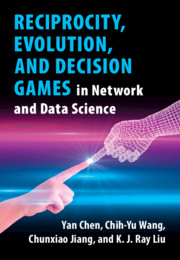Book contents
- Frontmatter
- Contents
- Preface
- 1 Basic Game Theory
- Part I Indirect Reciprocity
- Part II Evolutionary Games
- Part III Sequential Decision-Making
- 11 Introduction to Sequential Decision-Making
- 12 Chinese Restaurant Game: Sequential Decision-Making in Static Systems
- 13 Dynamic Chinese Restaurant Game: Sequential Decision-Making in Dynamic Systems
- 14 Indian Buffet Game for Multiple Choices
- 15 Hidden Chinese Restaurant Game: Learning from Actions
- 16 Wireless Network Access with Mechanism Design
- 17 Deal Selection on Social Media with Behavior Prediction
- 18 Social Computing: Answer vs. Vote
- Index
18 - Social Computing: Answer vs. Vote
from Part III - Sequential Decision-Making
Published online by Cambridge University Press: 01 July 2021
- Frontmatter
- Contents
- Preface
- 1 Basic Game Theory
- Part I Indirect Reciprocity
- Part II Evolutionary Games
- Part III Sequential Decision-Making
- 11 Introduction to Sequential Decision-Making
- 12 Chinese Restaurant Game: Sequential Decision-Making in Static Systems
- 13 Dynamic Chinese Restaurant Game: Sequential Decision-Making in Dynamic Systems
- 14 Indian Buffet Game for Multiple Choices
- 15 Hidden Chinese Restaurant Game: Learning from Actions
- 16 Wireless Network Access with Mechanism Design
- 17 Deal Selection on Social Media with Behavior Prediction
- 18 Social Computing: Answer vs. Vote
- Index
Summary
In many social computing systems, users decide sequentially whether to participate or not and, if they participate, whether to create a piece of content directly (i.e. answering) or to rate existing content contributed by previous users (i.e. voting). We present in this chapter a game-theoretic model that formulates the sequential decision-making of strategic users under the presence of this answering–voting externality. We prove theoretically the existence and uniqueness of a pure strategy equilibrium. We show that there exist advantages for users with higher abilities and for answering earlier. Therefore, the equilibrium exhibits a threshold structure and the threshold for answering gradually increases as answers accumulate. To show the validness of the game-theoretic model, we analyze user behavior data collected from a popular question-and-answer site Stack Overflow and show that the main qualitative predictions of the game-theoretic model match up with observations made from the data. Finally, we formulate the system designer’s problem and abstract several design principles that could potentially guide the design of incentive mechanisms for social computing systems in practice.
- Type
- Chapter
- Information
- Publisher: Cambridge University PressPrint publication year: 2021



